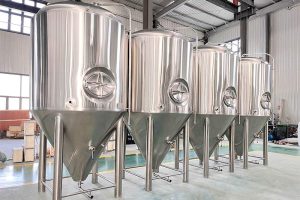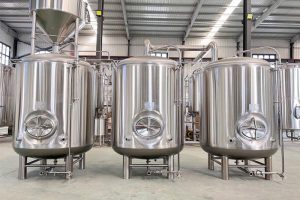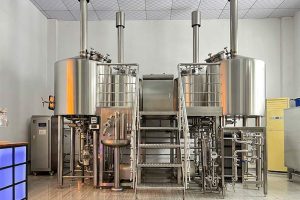
What is the purpose of a conical fermenter?
The gold standard for beer brewing is the conical fermenter, a tank with a bottom that tapers into a funnel. It is the best choice for home brewing or industrial brewing.

2BBL micro brewing equipment production completed
The brewhouse combination is 2 vessels with Mash/Lauter tun+Kettle/Whirlpool tank, usually used to brew 1-2 batches a day. It is equipped with two fermenters and can produce about 8bbl of Lager or 12bbl of Ale per month. Suitable for bars, home breweries, and restaurants.

Why do beer fermenters freeze?
During the beer brewing process, fermenters often freeze. A common phenomenon in small brewery fermentation tanks is the formation of ice on the tank as the beer cools after fermentation is complete. This will have a greater impact on beer brewing-related aspects and beer quality.

Why do brewery equipment need larger capacity hot water tanks?
Brewing beer involves using hot water, usually at a specific temperature. “Flushing” is used to soak the grains at a specific temperature to release the sugars. The sugar is then rinsed away using a “squirt” of water. This is the stage where a hot water tank (HLT) is used. This is the source of the hot water that becomes beer. The hot water tank is an important part of ensuring stable beer quality. In this article, we’ll take a closer look at commercial breweries’ hot water tanks and why they are an important part of consistent quality beer.

Best Brewing Equipment
The brewing industry requires specialized equipment designed to handle the intricate processes involved in producing high-quality beer. From fermentation tanks to bottling lines, the right brewing equipment can make all the difference in creating a consistent, flavorful, and marketable product. In this comprehensive guide, we’ll explore the best brewing equipment options available, their features, and

20 bbl brewing system
20 bbl brewing system is a common medium-sized professional brewery setup capable of producing around 620 gallons of beer per batch. This article provides a comprehensive guide to 20 bbl systems covering equipment, design, sizing, customization, suppliers, pricing, installation, operation, maintenance and more. Overview of 20 bbl Brewing Systems A 20 bbl brewery system is

Craft Brewery Tanks
Craft brewery tanks are a key equipment used in beer production in micro and craft breweries. Craft breweries are a vital part of the American economy, contributing billions of dollars in revenue and creating thousands of jobs. In recent years, the craft beer industry has experienced explosive growth, with new breweries opening up all over

Fermentation Machines
Fermentation machines are used to carry out the fermentation process on an industrial scale. Fermentation machines are the unsung heroes of our culinary world. These workhorses quietly hum away, coaxing simple ingredients into an array of delicious and nutritious products, from tangy yogurts and bubbly beers to fragrant sourdough loaves and rich wines. But what

automatic beer machine
automatic beer machine allow homebrewers and microbreweries to produce high quality craft beer with minimal effort. These integrated, automated systems handle the entire brewing process from mashing and lautering to fermentation and carbonation. Overview of automatic beer machine Equipment Imagine a contraption that transforms your thirst into a personalized pint of perfection, all at the

Mini Brew Conical Fermenters
Mini brew conical fermenters are small, cone-shaped vessels used by hobbyist and craft brewers to ferment beer on a small scale. They allow efficient fermentation and sedimentation of solids while taking up minimal space. Key Features and Benefits of mini brew conical fermenter Feature Benefit Conical Shape 1. Facilitates easy yeast harvesting and trub separation.
Learn more about winemaking
If you want to learn more about winemaking, you can subscribe to our blog for updates. We will update the blog every week so that you can learn more about winemaking.
